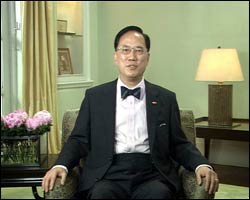


Banks are evil, rapacious institutions that rip off their customers with fees and charges while shirking their social responsibilities by closing branches in poor neighbourhoods, so they can make fat profits for their owners. That’s why banks form a significant portion of my stock portfolio. The dividends, like my salary, are transferred electronically into a savings account. However, my third source of income appears in the form of occasional cheques in the mail, and this involves physically making a deposit into either HSBC or Bank of East Asia, the two banks entrusted to look after the Hemlock Hoard. In days past, many ATM machines would spurt out an envelope and accept a cheque, but for some reason this is changing. Both banks now have dedicated cheque deposit devices, but they have taken very different technological approaches.
To do the job at HSBC, the customer inserts his ATM card into the magic, high-tech, full-colour, touch-screen, cheque-accepting machine. After a few seconds it gives the card back. The customer then jabs his finger on the number of the account he wants to put the money into, and the machine goes ‘beep’. Then the machine asks the customer to punch in the amount, so more jabbing and beeping. Then a green light goes on below the screen, and the customer carefully lines up the cheque, which must face the right way, in the mouth of a slot, and then gently slides it in. After an inch or so, something inside grabs the cheque and the light turns red. The machine then sucks the slip in. Then spits it out again. The customer tries a second time, and the equipment once more refuses it. On the third try, the thing works. After some clunking and whirring, a black and white photo of the cheque appears on the screen, followed by various questions – do you have another cheque or want a receipt? More jabbing with the finger and beeping, and finally the customer can go.
BEA offers a large, white case with a slit on the top – a ballot box. Also on top of it is a pen. The customer writes his account number on the back of the cheque, and drops it in. Then, out of curiosity, he peers into the slit to examine the highly complex technology within, and spies hundreds of cheques in the gloom.
Later, after midnight, BEA staff chained to their desks will sort through all the slips of paper and input the details into the computer system, which will mail an advice slip to the customer. Thus we see that HSBC makes its customers do much more of the work. A glance at the lines at the counters tells a similar story. BEA handles customers promptly, and throws in – at no extra charge – special extra groveling for the few Westerners among them. Meanwhile, HSBC makes everyone wait for ages under the menacing eye of security guards with electric cattle prods. The moral is – bank at BEA but invest in HSBC.
Tue, 6 Feb
The walk through Central to S-Meg Tower takes double the usual time this morning, as I find myself wading knee-deep through a viscous sludge of lame excuses.
Why did ATV’s English channel suddenly drop its Newsline programme featuring a discussion between Democratic Party boss Albert Ho and Liberal Party founder-turned-semi-democrat Allen Lee about the exciting Chief Executive election race? And why did they then suddenly backtrack and agree to broadcast it after all? The TV station’s official reason is that the dog ate part of the recording equipment, thus damaging the sound quality, but now we’ve managed to fix it. The real reason would be that the station’s owners, with their extensive Mainland connections, were petrified that giving airtime to a pair of Donald-skeptical commentators would be seen as the greatest act of disloyalty to the Motherland since Qin Hui sold out the north to the Manchus. Then they found themselves being criticized for the sort of spinelessness that gives Hong Kong a bad name on the rare occasions Westerners notice it, so they changed their minds because who watches English-language TV anyway? Meanwhile, ATV’s Chinese channel continues to portray pro-Beijing and pro-Government figures as honourable, heroic intellectual titans and only shows pro-democracy politicians when they’re picking their noses or getting caught fiddling their expenses claims.
Why did four grubby and malodorous sub-humans beat the aforementioned (by coincidence – this is a small town) Albert Ho in a McDonalds last August? The official reason is given by perpetrator Leung Kwan-ping, who said he contacted Ho’s office seeking help in claiming welfare because he was starving and later, dissatisfied with the legislator’s response, suddenly found HK$25,000 and decided to blow it on hiring his co-defendants to join him in assaulting poor Albert. The real reason would be that a wealthy sleazebag who believes himself to be above the law was upset at Ho’s work for an opponent in a legal case, called a discreet contact, who called someone he knows, who called a guy who fixes things, who paid the gang to do it. Casino mogul Stanley Ho (whose ownership of the same family name as Albert and participation in a legal case against someone Albert represents are just a few more uncanny coincidences) loudly called for the wealthy sleazebag to be brought to justice, but sadly this has not as yet happened.
Why does the Hong Kong Government insist on hoarding HK$830 billion in its financial reserves, while claiming that we need a goods and services tax and the city will soon be bankrupted by rising health care costs? The official reason is that Hong Kong is unique. On the one hand it is a strong economy, with strong and sophisticated markets and a rock-solid currency pegged to the US Dollar. On the other hand, deep down, it is a small and vulnerable fiscal and monetary weakling that could be beaten to a pulp by nasty evil hedge funds wielding globalised capital flows, so we obviously need at least this amount to defend ourselves. The real reason is that our bureaucrats refuse to believe that the money could possibly belong to anyone except them and it makes them feel big and important to sit on it, dreaming about all the unnecessary infrastructure they could buy with it, and telling the people who earned it in the first place to go away.
This is the official reason I get into the office late today.
The question on 7 million pairs of lips this morning – what is so special about the year 2032? That is the year Hong Kong will be allowed to have universal suffrage, according to reported and alleged comments attributed to our dashing Chief Executive Donald Tsang. Could it be something to do with the fact that it will be the year Sir Bow-Tie celebrates his 88th birthday? Or does “in 25 years’ time” simply sound suitably attention-grabbing? Despite describing himself as a ‘politician’ on his nomination papers, Donald is essentially unskilled in the black arts that genuine practitioners employ. His main trick is to manage expectations by leaking some disappointing and unpopular information, only to follow it up with an official announcement that is merely half-disappointing, thus sending us all into paroxysms of frenzied and joyous rapture.
His remarks about the pro-democrats using democracy to resist ‘one country two systems’ bring us into the murky realm where coded messages meet the big ego. As a bit of vaguely menacing, pro-Beijing, United Front blather, such a comment might go down well with the audience concerned – if they think he is saying that Hong Kong is part of a one-party state, and universal suffrage is incompatible with that status, and demanding universal suffrage is not merely pointless but tantamount to demanding the right to threaten one-party rule. But what if, when he says ‘one country two systems’, Donald is actually, if subconsciously, referring to himself? It might make the patriots of the DAB ask how the presumptuousness and arrogance of their new best friend tallies with his avowed loyalty to Beijing. The person grooming them to be his running dogs is the original colonial running dog himself.

A flashing red email marked Hyper-Urgent demands my attention …
It is to remind you that the unauthorized software is STRICTLY FORBIDDEN on all the S-Meg group PCs or IT equipments. In accordance with The “Company Copyright Ordinance Policy” the “unauthorized software” is classified as:
# Un-licensed software OR
# Software not endorsed by The IT Dept (including all personal software ie games, mobile phone software, non-Microsoft Screen Savers, trial version software, entertainment software ...& etc.)
Those who failed to comply may result in criminal or civil liability. The IT Dept would trigger a scanning tool to scan all PCs EVERY MONTH and the scanning results forwarded to the Human Resources Manager (Discipline and Punishment) for appropriate actions. Therefore, please remove all unauthorized software (if any) installed from your PCs with immediate effective.
Thank you for your attention.
IT Department
HONG KONG Monetary Authority boss Joseph Yam, in a booklet on the peg with the US Dollar, opines…
para 2, p 29
Fri, 9 Feb
The Revenge of Tung continues to take its terrifying toll on Hong Kong, as the world’s first and only state-owned Disneyland announces falling visitor numbers and revenues. These “were primarily due to lower attendance and guest spending,” according to the company. I would never have guessed. Meanwhile, in the gwailo’s lair in S-Meg Tower, I examine my PC and find that it is proudly hosting copies of Skyshape MP3Resizer, last.fm player, the excellent Copernic, Crossword Compiler, Word Web, ICQ and Yahoo Messenger (they can have those two), and Adobe – are we going to be shot at dawn for having Adobe? The presence of this unauthorized software on my PC is primarily due to the fact that it was installed on the hard drive.
HSBC stock has taken a tumble because of increased provisions for bad loans – which are primarily due to people not repaying the money they borrowed. “Sell!” proclaim the usual analysts, brokers and other sub-prime life forms. You don’t sell HSBC any more than you would sell a limb. It is as close as you can get to a proxy for the economy of this planet, which, since Western civilization took charge starting 500 years ago, has shown dazzling long-term growth. HSBC’s bad loans arise from its expansion into the USA’s sub-prime retail loans market – one step up from a pawn shop catering to crack addicts and trailer-dwelling welfare mothers. Over several years, the bank has made much more than it recently lost in this business, so they are still ahead. And one of the reasons to get into that market was to practice for the day when global development turns landless peasants and penniless slum dwellers into productive workers who form sub-prime loans markets in places like Mexico and India.
However – is HSBC’s trouble with mortgages in the USA indicative of a bigger, looming problem in that country’s economy? And what are we to conclude from recent reports that people in Chinese cities are pawning – no less – their apartments to raise funds to put into the local stock market, which rose 130 percent last year? Something to mull over during the approach of the weekend, which is primarily due to the imminence of Saturday.

